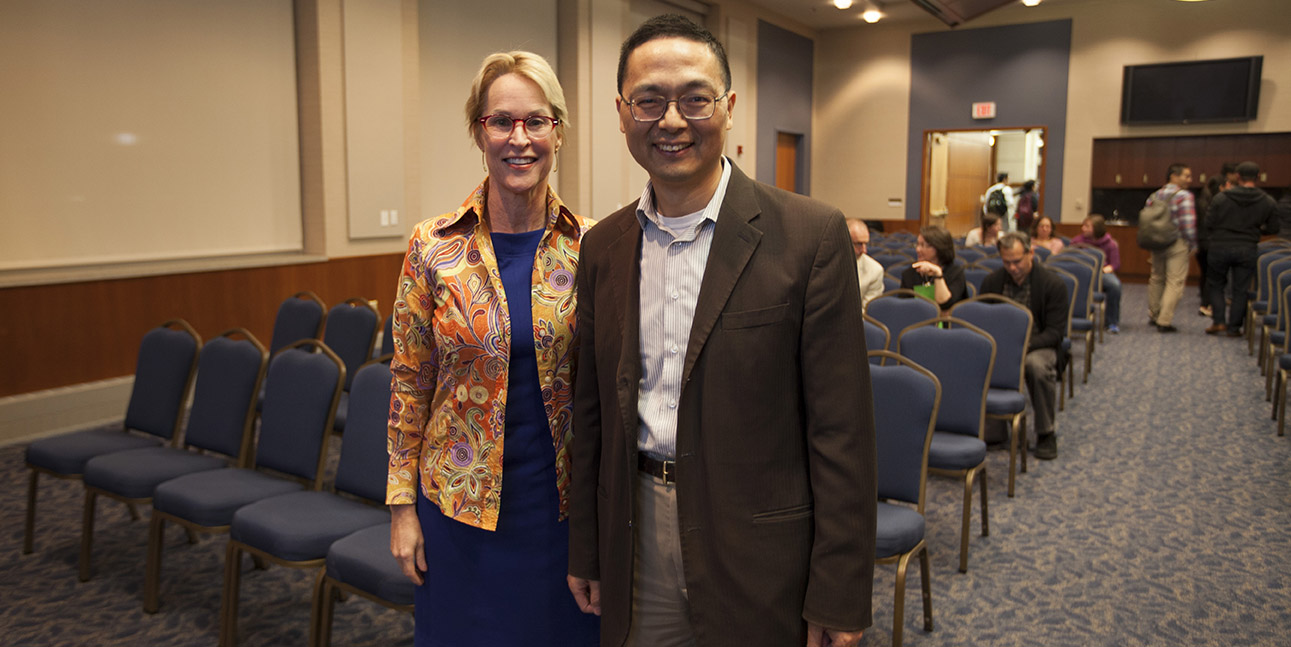Nobel Laureate Frances Arnold, former student Huimin Zhao celebrate award
On Monday, December 10, the Royal Swedish Academy of Sciences awards one half of the Nobel Prize in Chemistry to Dr. Frances H. Arnold, Professor of Chemical Engineering, Bioengineering, and Biochemistry at the California Institute of Technology for her work in the directed evolution of enzymes. She shares the prize with the team of George P. Smith of the University of Missouri, Columbia, and Sir Gregory P. Winter of the MRC Laboratory of Molecular Biology, Cambridge, UK, who collaborated on the phage display of peptides and antibodies.
Among those celebrating with Arnold will be Dr. Huimin Zhao, the Steven L. Miller Chair in the Department of Chemical and Biomolecular Engineering at the University of Illinois and leader of the Biosystems Design theme at the IGB.

“Frances had a huge impact on my career development and my personal life,” Zhao said. “She has always been my inspiration, dear mentor, and dear friend. She helped me grow my own career tremendously.”
As a PhD student at Caltech, Zhao was Arnold’s first graduate student to work in the directed evolution field.
“Frances pioneered the most powerful approach to enzyme engineering, directed evolution, and has used directed evolution to generate a broad array of new and useful enzymes. Together with Dr. Willem “Pim” Stemmer (who unfortunately passed away a few years ago), she created a new research field on directed evolution in the early 1990s,” he said.
Since then, thousands of papers have been published in this area by researchers across the world, and directed evolution is widely used in academic and industrial laboratories to optimize enzymes, antibodies and other therapeutic proteins, metabolic pathways, and even whole organisms, Zhao said. Directed evolution technologies form the basis of some specialized service companies and are practiced in small and major companies worldwide. These companies use enzymes that have been optimized by directed evolution to make fuels, such as ethanol; chemicals, such as 1,4 butanediol; plastics; consumer products like laundry detergents; research reagents; diagnostics, such as glucose sensors; and valuable pharmaceuticals.
Zhao joined Frances Arnold’s laboratory at Caltech in November 1992 and graduated in March 1998. As a student of Arnold’s, he developed a number of directed evolution technologies and used them to engineer enzymes as biocatalysts. Five of his papers were cited in the scientific background document prepared by the Nobel Prize committee and a Nature Biotechnology paper published in 1998 remains Arnold’s most cited paper related to directed evolution, according to Google Scholar.
After graduation from Caltech, Zhao worked at the Dow Chemical Company for two years. He joined the Department of Chemical and Biomolecular Engineering at University of Illinois in July 2000. His research program at Illinois is focused on protein engineering, metabolic engineering, natural product biosynthesis, and synthetic biology.
“We are interested in using directed evolution to create enzymes as biocatalysts for synthesis of valuable chemicals and drugs in an environmental-friendly manner,” Zhao said. “We are also interested in engineering microorganisms to produce chemicals and biofuels from lignocellulosic materials. In addition, we are interested in developing new tools to discover novel natural products from soil bacteria that can potentially be used as antibiotics and anti-cancer drugs. Finally, we are interested in developing genome editing tools for the treatment of human genetic diseases and fundamental studies of cell biology. As an underlying theme among these four application areas, we are developing a biofoundry, which is an integrated robotic system, to accelerate our bioengineering efforts.”
Earlier this year, Zhao won the Marvin Johnson Award from the American Chemical Society for “his pioneering contributions in the areas of directed evolution and synthetic biology for industrial and medical applications.” He has authored and co-authored more than 290 research articles and over 20 issued and pending patent applications with several being licensed by industry. He also has given plenary, keynote or invited lectures in over 350 international meetings, universities, industries, and research institutes. Twenty-two of his former graduate students and postdocs became professors in the United States (8), China (Mainland 9, Taiwan 1), Korea (2), Singapore (1), and Egypt (1).
Zhao holds faculty affiliations in the departments of Chemistry, Biochemistry, and Bioengineering, as well as visiting investigatorship at the Agency for Science, Technology, and Research in Singapore. He is also Conversion Theme Leader at the Center for Advanced Bioenergy and Bioproducts Innovation (CABBI), a U.S. Department of Energy-funded Bioenergy Research Center at the University of Illinois.
